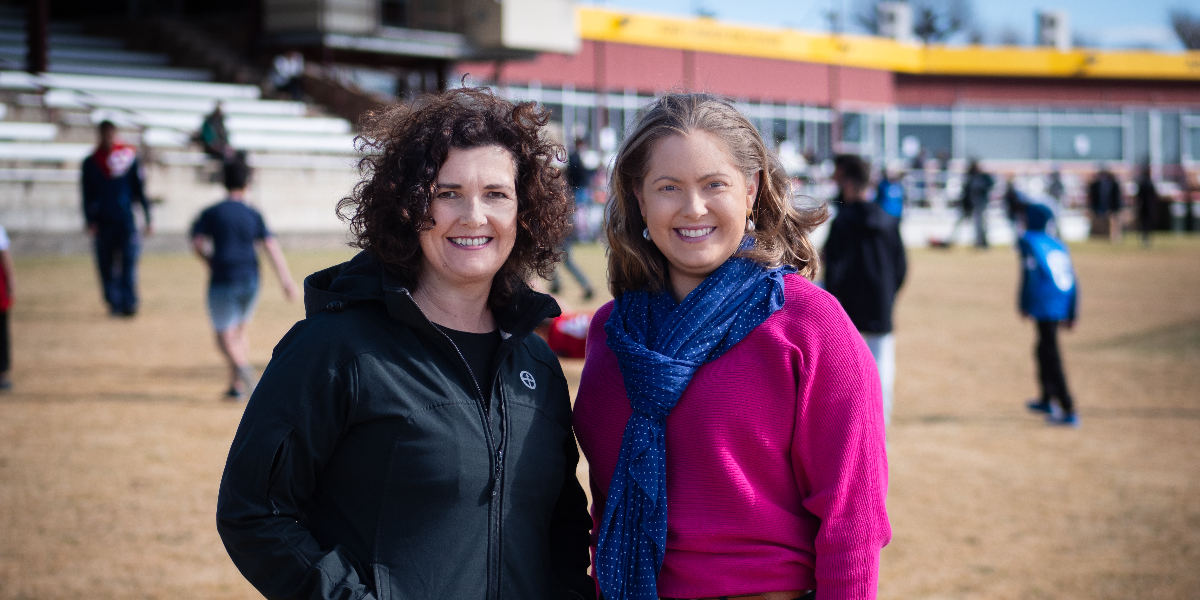A University of New England program to promote the wellbeing of Ezidi refugees through sport and physical activity has become a beacon for successful regional integration.
Despite COVID lockdowns and language barriers, the Driving Social Inclusion through Sport and Physical Activity (DSISPA) project has engaged hundreds of Ezidi people on multiple occasions since 2021.
It has helped to promote holistic health through exercise, create a sense of belonging in the Armidale community, foster social inclusion and greater acceptance of diversity, and strengthened partnerships that can benefit other residents well into the future.
Project masterminds Dr Kristy O’Neill and Professor Pep Baker, from UNE’s School of Education, say DSISPA has used Australian sporting culture as a vehicle for cross-cultural learning and connections. The investment in the physical and mental health of these new residents has not only produced many personal benefits; it has also yielded important lessons that might be applied elsewhere in the regional resettlement of refugee communities.
“Due to the input of the community, this project ended up being bigger and better than we had initially envisioned. We hope it will inform future best-practice transition models to assist other newly arrived migrants and refugees settle into regional and rural Australian communities,” Dr O’Neill says.
Research evaluating the success of DSISPA has highlighted the importance of providing supportive and accessible opportunities for physical activity for all genders, ages, backgrounds and family situations.
“Our research demonstrates that it is essential to support the whole person with refugee status very early in their settlement process,” says Professor Baker.
“It’s clear that a focus on community-based physical activity positively impacts on social inclusion, cultural understanding, mental health, physical health, growth after trauma, and community relationship building.”
Some 3,243 engagements have spanned women’s-only recreational swimming, football and volleyball, gym memberships and fitness classes, child and adult swimming lessons, and bush and beach safety days. With a focus on integration with existing community teams, clubs and facilities, the cross-cultural learning has been extensive.
DSISPA has relied on collaborative partnerships with interdisciplinary community providers such as SportUNE, Settlement Services International (SSI), Mosaic, Armidale Sanctuary Humanitarian Settlement, the NSW Service for the Treatment and Rehabilitation of Torture and Trauma Survivors (STARTTS), NSW National Parks and Wildlife Service and a variety of health, education, children’s and family services professionals.
Tim Gray, HSP (Humanitarian Settlement Program) Regional Coordinator at SSI, the non-profit organisation funded to provide on-arrival support to refugees in Armidale, highlights the women’s swimming as a standout success.
“Water confidence and safety is one component but the largely house-bound and responsibility-heavy Ezidi women have very little time to experience something new and to have their own space,” Gray says.
“The swimming is a social event masquerading as something else.”
He believes DSISPA was well timed, as the Ezidi people were looking to put down roots and engage more with the wider community.
“It has encouraged interactions with people who they may not normally engage with and, once they cross paths, barriers are removed,” he says.
“These activities and events have also provided a lovely way for new Ezidi families to meet older families.”
For those who have experienced trauma, physical activity has proven a wonderful vehicle for building life skills and relationships, according to Professor Baker.
“When we started, many of the Ezidi people wanted to stay in their own sporting teams, but now we are seeing greater integration,” she says.
“It’s become about true community engagement rather than just participation, and there has been similarly positive growth in the way Armidale residents accept and work to understand the Ezidi people and where they have come from.”
As well as being a valuable opportunity to learn about Australian sporting culture and etiquette, DSISPA activities have given Ezidi participants the chance to practice their English, enjoy the physical and therapeutic benefits of exercise, and achieve a degree of independence and agency.
Dr O’Neill says Armidale’s strong community spirit and open-mindedness have ensured the success of the DSISPA initiatives, many of which have depended on funding from the Australian Government Department of Health and the dedication of volunteers.
“Our project has helped to give the Ezidi people the foundations for a new life,” Dr O’Neill said.
“It has also influenced community attitudes towards them, as we have worked together to make Armidale the best home it can possibly be.”
“The Ezidi people arrived as refugees but have outgrown that term; they now consider themselves regular members of the community and want to be seen that way.”
This first large-scale, regional sporting project of its kind has already inspired spin-offs, with several DSISPA partners now working together to provide after-school programs for children from culturally and socio-demographically diverse primary schools in the region.
The Hunter New England and Central Coast Primary Health Network has also provided financial support for the women’s swimming group for the remainder of 2023.
Like what you’re reading? Support New England Times by making a small contribution today and help us keep delivering local news paywall-free. Support now


